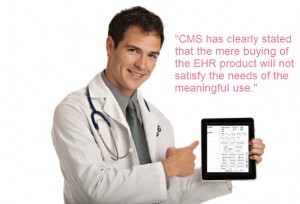The U.S healthcare industry is one of the most active segments in the world. The industry often faces great challenges of new process/software implementations while meeting the growing needs of healthcare. The current scenario in the industry requires the healthcare organizations to reduce costs and improvise the processes. Continue reading “Why outsource to medical billing specialists?”
Physician billing towards balanced work
After the chaos that the HIPAA 5010 implementation has created in the industry, there are multiple unanswered questions before us. It all revolves around two factors – Healthcare implementations and the day to day billing operations. Are we striking proper balance between the two? Are we taking the medical billing and coding implementations seriously? A genuine answer to the questions would be a big ‘no’ from most of us. Continue reading “Physician billing towards balanced work”
SGR – latest
The Speaker of the House of Representatives has announced that the House GOP Caucus has agreed to pass the short-term (two month) SGR fix. The House could pass the legislation as early as tomorrow but it is also possible that the vote will have to wait until next week. The bill that is expected to be passed would continue the 2011 Conversion Factor for the Medicare Physician Fee Schedule until March 1. The Congress will have to pass another “fix” between now and February 29th in order to prevent an SGR related cut on March 1st. Continue reading “SGR – latest”
Sustainable Growth Rate – The Damocles sword that hangs over Physicians
The Holiday Season is here and whilst the entire US and most people across the globe celebrate the festive spirit of the season, there is one large group that gets into a fear psychosis around this time of the year – Not the airline passengers that need to go through increased security by the TSA, but Medicare beneficiaries and their Care Providers – the Physicians. Continue reading “Sustainable Growth Rate – The Damocles sword that hangs over Physicians”
EHR and meaningful use
 EHR has been around for more than 15 years now, but only in the last couple of years has there been an active and conscious move towards adoption. The impetus was provided by the ARRA Act that incentivized the adoption and implementation of the EHR in Clinical practices. Though the deadline for implementation is 2015, clinical informatics confirms that more than 50% of the surveyed healthcare professionals are already using EHR for their practice and more than 90% of them are happy and as adept at using the EHR as they were with the paper SuperBills. But, does this mean that the Practices are complying fully and satisfying the main objectives of the incentive plan for EHR adoption? The answer to that question is self-evident. Moreover, just implementing the EHR is beneficial to the Providers to a small extent, but does not meet with the final objectives of either the ARRA Act or CMS. Continue reading “EHR and meaningful use”
EHR has been around for more than 15 years now, but only in the last couple of years has there been an active and conscious move towards adoption. The impetus was provided by the ARRA Act that incentivized the adoption and implementation of the EHR in Clinical practices. Though the deadline for implementation is 2015, clinical informatics confirms that more than 50% of the surveyed healthcare professionals are already using EHR for their practice and more than 90% of them are happy and as adept at using the EHR as they were with the paper SuperBills. But, does this mean that the Practices are complying fully and satisfying the main objectives of the incentive plan for EHR adoption? The answer to that question is self-evident. Moreover, just implementing the EHR is beneficial to the Providers to a small extent, but does not meet with the final objectives of either the ARRA Act or CMS. Continue reading “EHR and meaningful use”
Choosing a good medical claims processing software
We are going to discuss now, about the features that good medical claims processing – the medical billing software should possess. Well, most of us would have already chosen a software that suits our needs or at least learnt to survive with a software that’s chosen in rush. Some of us may even be in look out for good medical billing software as well. Whatever be the case, we should know the latest advancements that different medical claims processing software companies have introduced in the recent years. Is it really important to spend time in analyzing the features to choose suitable medical claims processing software? Certainly. Experienced medical claims processing professionals would have realized that medical billing software plays a major role in healthcare revenue cycle management process and aids in every step towards collecting money. The better the features are, you will get maximized benefits. But, it is tough to find all advanced features in the same software. Continue reading “Choosing a good medical claims processing software”
e-Prescribing – an Overview
 e-prescribing, as clearly explained by CMS, ‘is the ability of the qualified physicians to electronically generate an understandable prescription and send directly or through commercial pharmacy network to a participating pharmacy’. The main reason behind implementation of e-prescription is to reduce medication errors & improve quality of care in the United States.
e-prescribing, as clearly explained by CMS, ‘is the ability of the qualified physicians to electronically generate an understandable prescription and send directly or through commercial pharmacy network to a participating pharmacy’. The main reason behind implementation of e-prescription is to reduce medication errors & improve quality of care in the United States.
Latest research reports on medical errors indicate that every year in the U.S. 1.5 million people are affected and thousands of people die due to ‘medication errors’. The alarming numbers reveal the need to follow a prescribing system that improves the accuracy of prescription. That’s why there is a strong push from the government of the United States to implement e-prescription system.
‘e-prescription implementation – incentive & penalty plan’ put forth by CMS.
CMS encourages physicians to implement the new electronic prescribing system by providing financial incentives if they implement e-prescribing on time and penalizing if they don’t. Continue reading “e-Prescribing – an Overview”
Clinical documentation needs of ICD-10
Clinical documentation is an integral part of health Information Management. The clinical documentation needs doesn’t end with diagnosis and treatment of patients. It is also needed for efficient medical claims processing. Clinical documentation remains the source for the coders to assign the exact diagnosis and procedure codes. Let’s explore more about the dependency on clinical documentation with ICD-10. Continue reading “Clinical documentation needs of ICD-10”
Coping with productivity drop during ICD-10 transition
 Many healthcare entities as well as medical coding & billing companies are concerned about ICD-10 transition. What’s stopping medical coding & billing companies? Apart from the initial hurdles and cost factor, the main troubling parameter is productivity drop during ICD 10 transition. It is estimated that there will be a drop in productivity by 20-50% during ICD-10 implementation, varying for different medical claims billing entities.
Many healthcare entities as well as medical coding & billing companies are concerned about ICD-10 transition. What’s stopping medical coding & billing companies? Apart from the initial hurdles and cost factor, the main troubling parameter is productivity drop during ICD 10 transition. It is estimated that there will be a drop in productivity by 20-50% during ICD-10 implementation, varying for different medical claims billing entities.
It is common that there will be stagnancy in work during implementation of any new process. But ICD-10 has turned out to be a big challenge to the medical claims billing industry, affecting the daily operations. To balance this, it is essential to follow a streamlined productivity improvement plan that will efficiently solve the productivity issues. Continue reading “Coping with productivity drop during ICD-10 transition”
Dos & don’t of ICD 10
If you are a physician billing company providing physicians billing services to hospitals & medical practices, you have to take extra care to implement ICD-10. As a provider of physicians billing services, you will be responsible for complete ICD-10 transition and you cannot depend majorly on your clients. Continue reading “Dos & don’t of ICD 10”

